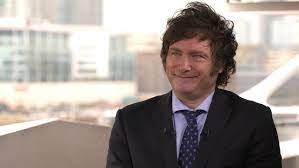By Walter Russell Mead
Buenos Aires
“Don’t worry,” God said. “It will all work out. Wait until you see the Argentines.”
There are no objective reasons this once-prosperous country shouldn’t be one of the richest places on earth. But for roughly the past 100 years, Argentina has been one of the most disappointing economic stories in the world. Measured by per capita gross domestic product, the country was one of the 10 richest countries in the world before the Great Depression. In 2022 it ranked 67th, according to International Monetary Fund data.
When I first came here in the 1980s, I remember watching a family of beggars on the steps of the cathedral as 1-peso notes blew past them in the wind. At 640 pesos to the dollar, it wasn’t worth the effort to snatch them out of the air.
Visiting Buenos Aires again last week, I was struck by how little has changed in 40 years. On the positive side, the city is as beautiful and as culturally vibrant as ever. Economically and politically, however, it seems locked in a time warp. The black-market dollar is still called the “blue dollar,” and people pop up everywhere with offers to exchange it. Ordinary Argentines struggle to make ends meet. Inflation remains a national preoccupation. Last week the peso was again in free fall, and inflation was around 200%. The official exchange rate for the peso fell past 800 to the U.S. dollar, with rates of more than 1,000 available on the black market.
I met Argentines who hoped the recently inaugurated president, Javier Milei, could finally put the economy on a solid foundation after a century of erratic ups and downs. Others have grown jaded with promising new initiatives. In 1989, Carlos Menem was going to stabilize the economy with his de facto dollarization, and in the optimistic atmosphere of the era, Washington policy makers, think tankers and Wall Street investors swallowed the story whole. The Menem era ended in tears as the peso collapsed amid a massive economic crisis.
It will take courage, vision, luck and skill to dismantle the dysfunctional institutions and policies that hold Argentina back. Mr. Milei has made solid moves during his first month in power, by cutting subsidies and pruning some of the regulations and red tape that threaten to strangle the struggling economy. Yet it remains to be seen if he can lead Argentina into prosperity. With a hairstyle crafted, according to his image consultant, Lilia “Lady Lemon” Lemoine, to blend Elvis Presley and Wolverine, Mr. Milei has worked as a TV pundit endorsing both libertarian economics and tantric sex. He’s called Pope Francis “the representative of the Evil One on earth,” and is the proud owner of five cloned dogs.
Worse, of 257 seats in Argentina’s lower house, Mr. Milei’s allies occupy only 38. They hold a mere seven of the 72 spots in the Senate. The courts and bureaucracies teem with bitter critics of his reforms. Argentina’s powerful labor movement hates him.
We should wish Mr. Milei and the roughly 56% of Argentines who elected him well, but I leave Buenos Aires wondering whether Argentina’s past will be America’s future. Under the long shadow of Juan Perón (1895-1974), populist economics, weak institutions, political polarization and contempt for the rule of law have defined Argentine politics for decades. It isn’t hard to spot signs of similar social dysfunction in the U.S. today.
Perón wanted an Argentine economy based on state-directed investment, with officials under his thumb selecting favored industries and telling them how to do business. Thanks to an iron triangle of government bureaucrats, business depending on government incentives and protection for profit, and unions fighting for government subsidies to the corporations that sheltered them, Perónism was as politically successful as it was economically damaging.
President Biden often seems to be a woke Perónist, hoping to build a new American economy around the diktats of green economic planners and diversity consultants, protected manufacturing industries and loyal unions basking in government favor. It takes two to tango, though, and Donald Trump and some GOP populists have also embraced the economics of Argentine decline. Some of the harshest criticism of Mr. Milei’s victory came from those on the so-called new right. Compact magazine editor Sohrab Ahmari slammed the “Argentine weirdo” who was “seemingly grown in a secret laboratory funded by the Koch brothers” for his determination to liberalize Argentina’s system of industrial tariffs.
Fortunately, suspicion of an overreaching state is one of the enduring elements of American populism. Modern America has its problems, but what wrecked Argentina won’t fix the U.S.





